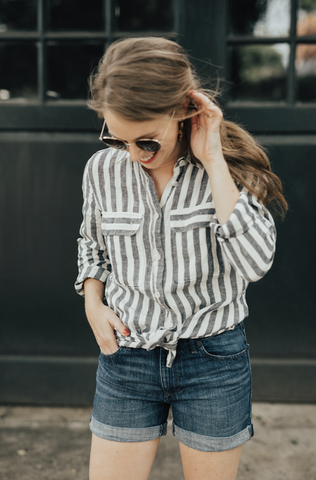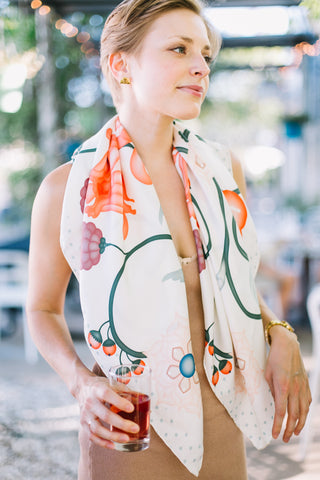Sustainable fashion is the way of the future if we are to preserve this beautiful planet we live on. As consumers, you have a choice of where to spend your hard earned money. With fast fashion creating such a (literally) toxic and over-consumed corner of the fashion industry, why not invest in thoughtful, eco-conscious pieces that help preserve our health as well as the beauty of the planet. The key to accomplishing this lies in
our intentions and a dedication to
transitioning to a eco-friendly wardrobe.
One of the best ways to shop sustainably is to shop online. By doing your shopping online, you're making an educated decision to purchase an item, (hopefully) being able to see the story and materials used behind the item, like we provide at Joon + Co., without the temptation to buy something simply because it's there in front of you.
When it comes to sustainable shopping, eco-conscious materials, and greener lifestyle choices, the ethical fashion's blogging community is where it's at. We've rounded up input from 4 of the industry's top influencers on ways to shop more sustainably online, so read on to add these highly effective tips to your ethical shopping arsenal. Once you've absorbed all of these lovely ladies' infinite wisdom, make sure to check out and shop our
Sustainable Collection of gorgeous, eco-friendly pieces.
I think there are two sides to this answer: practical tools and psychological ones.
On a practical level, resource yourself. Switching your blog reading to ethical and eco minded writers is a good place to start, as it helps you learn what to consider and prioritize, as well as find alternative options and inspiration from a variety of sources, many of which are online retailers. There are also some amazing resources in the online sphere now. My favorites are Done Good, a browser extension that suggests ethical alternatives when you use Google, Amazon or major brand websites and Ecosia, a search engine alternative that plants trees as you do your research. Sustainability online is not such a small world any more.
However I think the mental side of it is the key. At the end of the day, the least sustainable part of the fashion industry is the push for over consumption. We simply do not need as much as the world is trying to tell us we do. As a blogger it can be hard, as we talk about so many brands and options,
please don't constantly buy from every single retailer we ever talk about. Our blogs exist as references you can visit whenever you need to buy something, so you can look at your options. It's about revamping our attitudes to what we buy and why, and disengaging from the cycle of buying for some sort of instant gratification that doesn't work. Avoid impulse buying. If you don't feel strong enough, block those fast fashion websites and remove the temptation until you're disengaged with a model thats unsustainable for the world and unhealthy for you. You'll suddenly have many more resources to
buy long-lasting, better quality, sustainable goods, all the while supporting good businesses that are working hard to provide a beautiful, ethical alternatives.

The ethics around what we wear are a very personal choice and what I deem to be ethical and sustainable will not be exactly the same for you but you can use these tips as a basic guide.
Buy good quality every time. It’s much better for your bank balance and the environment if you invest in a few well made items of clothing rather than having an overstuffed wardrobe of poorly made ones. It’s expensive in the short term, but these clothes will keep their shape and color and last longer, saving you money in the long term.

Shopping sustainably for my clothing, accessories and beauty products has been my favorite adventure with The Good Wear blog - and it makes a huge impact for our lives and others. I've focused on less is more and there are hundreds of brands that exist to better this industry through focusing on fair wages, safe working conditions, recycling, environmental impact, and giving back to global and local communities. Shopping ethically + sustainably may be intimidating at first, but there are ways to make this easier. Find brands and companies who are transparent about what they believe in and who they support - like Joon Co. Save up to purchase high quality items that do good. And rewear + love the items that you purchase! If you don't, give them to someone who will! Shop smarter and shop small, it will change your life!

Sustainable shopping is really a multifaceted challenge. I say this because it requires the consumer to do more heavy lifting, so shopping becomes less of a 'thrill' and more of a research project.
First, consumers have to learn what the indicators of a truly sustainable company are before they shop so they don't get greenwashed. For instance, what fabrics are most sustainable? Are certain ones more chemical intensive than others? How can they tell if a brand is being 'transparent' with them? Then, there's the second piece to sustainable shopping that requires thoughtfulness in decision-making. This is where the consumer has to ask, "okay do I really need' this garment? It can be a lot to wrap their head around.
Luckily, online shopping makes this process much easier. Mainly because it eliminates the temptation of in-store impulse buying. So if you're doing that, you've already taken the first step. Here are a few of my favorite tips:
-
Follow a few respected bloggers in the space (the EWC is great for that), they usually have shopping pages like mine. So they've done the hunting for you. You just have to decide which brands fit your style.
- On a brand's site, look for a page dedicated to sustainability or one that outlines the company's ethical practices. If it's vague and packed with jargon, steer clear.
-
Download a Chrome extension called DoneGood. If you're visiting on a conventional fashion page it will alert you and suggests ethical alternatives. It's a great "first-step" discovery tool.
- Lastly, try communicating with the brand. Reach out over social media, or send them an email to see if they respond and are open to your questions about sustainability.








